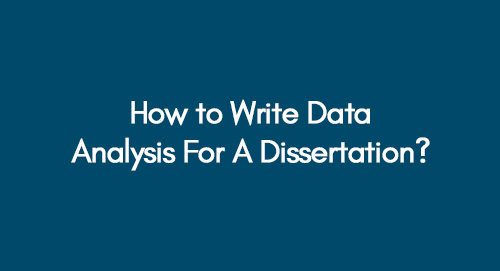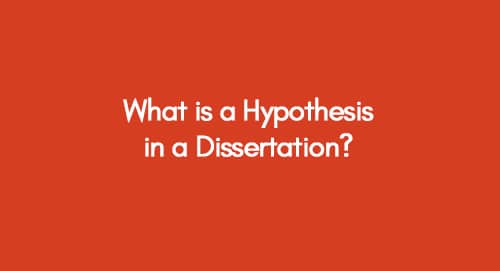
How to Write the Appendix of a Dissertation?| A Guide
August 25, 2022
How to Write Data Analysis for a Dissertation?| A Detailed Discussion
August 27, 2022In the vast landscape of academic inquiry, the hypothesis stands as a beacon of focus, a starting point that ignites the pursuit of knowledge. It is a pivotal element in the journey of every dissertation, a concise statement that encapsulates the essence of the research endeavour. A well-constructed hypothesis defines the research's purpose and sets the course for systematic investigation and analysis.
Find In-depth Details on Research Projects Here
In this article, we comprehensively explore the role and significance of the hypothesis, dissecting its various forms and illuminating its critical position in the research process. Whether you are a seasoned researcher or taking your first steps into the world of academia, the hypothesis remains a cornerstone, a guiding light that shapes the inquiry, fuels curiosity, and ultimately leads to the unveiling of new insights and understanding. Unlock the essence of a dissertation hypothesis with our blog post, clarifying 'What is a Hypothesis in a Dissertation' for your research journey.
What is a Hypothesis in a Dissertation?
Hypotheses play a vital role in any study. How would you define the underlying belief of a dissertation? It serves as a response to the researcher's posed research question. Derived from the examined facts, it anticipates connections among them. After analyzing the selected research issue, the researcher develops initial notions about the relationships between known facts by addressing the most significant concerns.
Explore What is Hypothesis in Psychology?
The research hypothesis gradually takes effect on this basis. Dissertation hypotheses are vital for scientific research: they guide study direction, enhance result prediction, inform data collection, and validate theories through experimentation.
Learn More About Research Hypothesis Here
Expert Tip: Crafting an accurate hypothesis requires a firm grasp of the historical context and theoretical foundations within the field where the issue is situated.
What are Some Characteristics of a Dissertation Hypothesis?
Here are some points to remember:
Sources that can be trusted should be included in it. It is your responsibility as an author to defend your position, so be sure you include testable assumptions and material that is available on the internet. The problem studied must be emphasized, and powerful statements should be delivered.
There should be no question about it. You should not turn a hypothesis into a rhetorical question that doesn't need an answer. Dissertation hypotheses are more positive than thesis statements since you need to research and draw conclusions.
There should not be too much complexity. It implies that your readers also understand the point if you make the dissertation hypothesis overt. Conversely, defending your position risks falling into the wordiness trap. Make a brief, precise idea that represents your concept, and check the word limit.
References and citations should be included. If there are no references, what is the point of a hypothesis? References and bibliographies that helped you make an advanced step in that area should be cited along with previous authors and problems studied earlier. Give credit to the researchers when you base your academic paper on their work.
Why is the Dissertation Hypothesis Important?
A research hypothesis is a prediction about the outcome of a study that can be tested. This includes variables and their relationships as well as aspects such as the population. Based on empirical evidence, it specifies the role played by each element. In conducting research, the researcher makes certain assumptions. As far as we know, the aim is to present the expected results after they are tested.
- This ensures the validity and scientific integrity of the entire research process.
- The probability of failure and progress in research can be assumed.
- As a result, it helps connect the underlying theory and the specific research question.
- In addition, it assists in data analysis and measures research validity and reliability.
- It proves the validity of the research by providing a basis or evidence.
- In contrast to theoretical descriptions, it helps to describe research studies in concrete terms.
Main Sources of Hypothesis
- Theoretical science.
- Observations based on previous studies and current experiences.
- Similarities between different phenomena.
- A general pattern of thinking that affects people.
What are Some of the Types of Hypotheses?
Understanding the concept of hypotheses completely is essential for creating a good hypothesis. It is, therefore, important to understand the different types of hypotheses before you begin writing.
Regarding types, there are mainly two, namely Alternative and Null hypotheses.
1. Alternative Hypothesis
Academically, it is often referred to as H1. Identifying the expected outcome of your research procedure is the purpose of this type of research. Furthermore, it can be further classified into two subcategories:
The first is directional: This statement specifies how to gather the expected results. In most cases, it is used to establish a relationship between variables rather than to compare multiple groups.
Example: The performance of athletes on the field will be improved by attending physiotherapy sessions.
Another alternative hypothesis is non-directional: As the name implies, a non-directional alternative hypothesis does not suggest a direction for the expected outcomes.
Example: Attending physiotherapy sessions affects an athlete's performance on the field.
Observe carefully the two statements in the above examples. A directional statement states that physiotherapy sessions will enhance or boost performance. Non-directional statements establish a correlation between the two variables (physiotherapy sessions and performance). There is no indication, however, that physiotherapy sessions will result in better or worse performance.
2. Null Hypothesis
H0 is the null hypothesis. As opposed to an alternative hypothesis, there is a null hypothesis. This is a statement that defines the opposite of what you expect to see during your research. Essentially, a null hypothesis asserts no relationship exists between the variables specified in the hypothesis.
The last example can be stated as follows to provide an idea of how a null hypothesis is written:
Example: On-field performance is not affected by physiotherapy sessions.
Alternative and null hypotheses are written to clarify and examine the research problem in detail. A research problem statement is a question that is not valid or testable, while a hypothesis is a hypothesis that can be tested. The former, however, can be tested, validated, or denied.
3. Simple Hypothesis
Statements that reflect the relationship between dependent and independent variables are called dependent statements. You will understand the example if you follow it through,
Examples:
- Lung cancer is a common result of smoking
- Obesity may result from sugar-rich diets
4. Complex Hypothesis
Depending on the research problem, complex hypotheses imply a relationship between several dependent variables. You can better understand this by following the examples below:
Examples:
- A person who eats more fruits tends to have a higher immunity, a lower cholesterol level, and a higher metabolic rate.
- Work hours can be made more productive by taking short breaks during them.
5. Empirical Hypothesis
A "Working Hypothesis" is also known as an experiment that validates a theory. As a result, the statement appears plausible and not just a wild guess.
In order to learn how to create an empirical hypothesis, here are a few examples:
Examples:
- Anaemia is less likely to occur in people who take iron tablets than in ones who take vitamin B12.
- Giving food immediately after obedience to a command helps dogs learn faster.
6. Statistical Hypothesis
The statistical hypothesis is a statement claiming an explanation based on a sample of the population. An example of logic-based analysis is researching a particular population and gathering evidence using a certain sample size.
The following are some hypothetical statistical statements to help you understand how your research can be conducted by leveraging statistical data:
Examples:
- 54% of Canadians are between the ages of 22 and 27
- An Agro-based industry in Kenya employs 57% of the rural population.
Hypothesis VS Prediction: How Do They Differ?
Hypotheses can mean predictions, too, causing confusion. Both are guesses but different. Hypotheses are for science; predictions are more common outside of science. A hypothesis is like a smart guess. It uses what we've learned to understand things we're unsure about. It connects facts to make an educated scientific guess. Experiments test these guesses. Assumptions are what you think will happen in the study.
Predictions are different. They're often just guesses without proof. While they could be scientific in theory, they usually lack facts. Predictions guess what might happen, often by people who don't know much. Also, how we prove these is very different. Predictions have only one test: if they're right or wrong when the event happens. Hypotheses can be tested many times by different scientists using various methods.
The following examples will help you better understand the difference between a hypothesis and a prediction:
Example Hypothesis: Eating more fruits and vegetables will lead to faster weight loss and a cleaner body.
The hypothesis is based on general knowledge (i.e. fruits and vegetables have fewer calories than other foods) and past experiences (i.e. people who choose healthier foods like fruits and vegetables lose more weight). Though it is still a guess, it is based on facts and can be tested.
Example Prediction: 2023 will be the end of the world.
A prediction foretells what will happen in the future. However, given the lack of actual grounded evidence to support this claim, it is a fictional assumption.
How to Develop a Hypothesis?
It is not easy to select a hypothesis. Let us suppose you have chosen an intriguing topic with lots of research potential. It may be difficult for you to choose a dissertation hypothesis in this case. When you have multiple exploration sources, it can be challenging to determine the hypothesis. These dissertation hypothesis writing guidelines/steps can help you improve the quality of your hypothesis part.
1. Conducting Research is the First Step
Before creating a hypothesis, a person should collect considerable information. You should read as much as you can on the topic under research; you should read books and articles by scientists, experts and professionals who have examined something related to your topic. By absorbing their knowledge and experience, you will be ready to conduct your own research. Gaining new facts may enable you to analyse other scholars' thoughts objectively and even criticize them after gaining new knowledge about your problem. You are ready to conduct research when there is something that has not been investigated about your topic. Make a list of what you would like to investigate.
2. Hypothesis Generation is the Second Step
It is now time to formulate a clear hypothesis based on your research. When a student chooses a research topic, they often have an idea of what they are going to investigate. At this step, many students fail to realize the problem of their research and need time to enhance their knowledge by reading clever thoughts by famous scholars. Each student must submit a dissertation proposal with a hypothesis or approximate thesis statement to be considered for a dissertation, but a true hypothesis is only presented after thorough research is conducted. Your hypothesis will be supported by the data and evidence you collect after you complete the investigation.
3. Supporting Your Hypothesis in Step Three
Half the success lies in brainstorming good concrete hypotheses that attract the reader's attention. You will be awarded a degree when your professor recognizes that your dissertation deserves to be read. To answer this rhetorical question, you asked at the start of the dissertation, you must support your hypothesis with reliable evidence. In other words, you should support your hypothesis throughout the dissertation in order to persuade the reader. Utilize the ideas of renowned scholars and experts in your field as well as your own research.
What are Some Tips and Tricks for Writing A Good Hypothesis?
Below are some tricks and tips for your convenience:
- For a dissertation hypothesis to be effective, you will need to design an experiment that will allow the data you collect to be analyzed statistically. Hypothesis testing begins with this step. It is possible to reject either type of hypothesis through statistical analysis. As the student, you will have to refine or redesign the research hypothesis if it is rejected.
- When formulating your dissertation hypothesis, conduct thorough research. Do not assume that your alternative and null hypotheses are true out of the blue. You have to believe them to be true. An effective dissertation hypothesis can be backed up by literature and research.
- The hypothesis should be simple enough for the reader to understand. As a writer, if your hypotheses are complicated, it can be hard to explain your ideas well. Know how many words you're expected to use for your hypothesis, and once you've got that, make sure it's short and to the point.
- Always make sure that the hypothesis is related to your paper's aims and objectives. This is crucial if you are making a vague or ambiguous claim. Moreover, the hypothesis should be linked with your research questions; through it, your readers should be able to get a clear sense of what you are trying to convey. You will be able to establish this relationship pretty well if you get dissertation help from a professional writer. In case you are too worried: do not be because you have firm support to rely on since we are experts at providing dissertation writing assistance.
- Remember that citations and references should also be included. In order to give credit where it is due, you should cite any work you used to develop your ideas.
FAQs about Dissertation Hypothesis
The hypothesis should not be just a guess - it should be supported by existing theories. A testable hypothesis can also be supported or refuted using scientific research methods (such as experiments, observations, or statistical analyses of data).
There is more to a hypothesis than just a guess. Knowledge and theories should be incorporated into it. Furthermore, it should be testable, which means that it can be demonstrated or disproven by scientific research methods (such as experiments or observations, as well as statistical analysis of data).
Get 3+ Free Dissertation Topics within 24 hours?



























